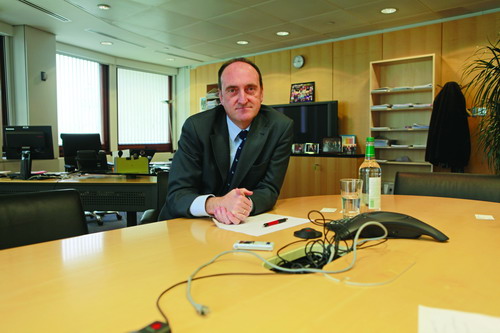On the same wavelength
Updated: 2013-03-21 17:16
By Cecily Liu and Zhang Chunyan (China Daily)
|
||||||||
|
 Luis Alvarez sees great opportunities to provide telecommunication services in the Chinese market. [Photo / China Daily] |
A British company with a proud and long history strikes up a relationship
Luis Alvarez knows that sometimes only a face-to-face chat will do instead of a big statement from someone high up in a telecommunications company.
Which is why Alvarez, chief executive officer of global services at British Telecom, makes the trek to China a few times a year to catch up with his customers.
"There are two benefits," Alvarez says. "Firstly, I listen directly to my customers; I hear what they are trying to do and what their requirements are on an international scale. Secondly, it is important to show customers that BT's China team has support from its global services."
It is not as though Alvarez does not have other matters on his plate. The "global" in his job title can be taken literally, because BT has a presence in 170 countries.
But for Alvarez the great attraction of China is the possibility it gives BT to cash in on cross-border investment between China and the rest of the planet.
"China is important for us. First, our global customers are rapidly expanding into China, and we have to be there to support them. Second, many Chinese multinationals are establishing themselves abroad, which we can also help them with," he says.
"At the same time, new opportunities are emerging for telecommunications services in China, for example in its medical care system, which we are very excited about."
In at least one way BT and China have something in common. While the Chinese often vaunt their country's long history, BT can boast that it is a direct descendant of the Electric Telegraph Company, the first company of its kind in the world, set up in 1846. Adding another dimension to BT's place in history is a statue outside its global headquarters near St Paul's Cathedral in London. It is dedicated to one of the inventors of radio, Guglielmo Marconi, who made the first public transmission of wireless signals from the site in 1896.
BT, which is now Britain's biggest fixed-line phone company, expanded into China in 1985 by setting up offices in Hong Kong to serve the very first multinationals entering China as the country opened up to foreign investment. Among them were Unilever and Procter & Gamble.
Working closely with China's domestic operators such as China Telecom and China Unicom, BT provided these multinationals services including communications systems, web security systems and data centers, Alvarez says.
But more recently, BT's customers in China have grown to include many Chinese companies keen to adopt the latest technology in their process of internationalization. Among those Air China and Haier.
BT's China team has expanded to about 600 employees. It has also set up a research center in Beijing jointly with Tsinghua University, and a technology and service center in Dalian, Liaoning province, where it develops software jointly with Chinese customers, tailored towards their needs.
"We have to first understand our customers' demands and work out how we can better their software," Alvarez says. "Then we jointly develop the new software with our customers."
Dealing with Chinese customers has made him realize that Chinese companies are keen to adopt best practices globally, he says. "They want to know how we have helped to introduce solutions to companies in other countries, and they are keen to have the best technology.
"Our advantage is to bring our experiences in Europe and many other countries in the world to help China."
Alvarez says that despite BT's global reach, localization is a value at the heart of its corporate culture. It is achieved by staffing each office with locals who are familiar with the surrounding market, but also have the skills to report back to BT's head office.
- China-UK trade in robust growth despite euro crisis
- New books to promote Sino-British business contacts
- Chinese visitors seen as game changers
- Telecom giant on lookout for overseas M&As
- Huawei set to beat Ericsson
- China to open up mobile telecom sector
- Telecom firm sets goal of 200m users
- Telecom plans 'will help break' industry monopoly

 Li Na on Time cover, makes influential 100 list
Li Na on Time cover, makes influential 100 list
 FBI releases photos of 2 Boston bombings suspects
FBI releases photos of 2 Boston bombings suspects
 World's wackiest hairstyles
World's wackiest hairstyles
 Sandstorms strike Northwest China
Sandstorms strike Northwest China
 Never-seen photos of Madonna on display
Never-seen photos of Madonna on display
 H7N9 outbreak linked to waterfowl migration
H7N9 outbreak linked to waterfowl migration
 Dozens feared dead in Texas plant blast
Dozens feared dead in Texas plant blast
 Venezuelan court rules out manual votes counting
Venezuelan court rules out manual votes counting
Most Viewed
Editor's Picks

|

|

|

|

|

|
Today's Top News
Boston bombing suspect reported cornered on boat
7.0-magnitude quake hits Sichuan
Cross-talk artist helps to spread the word
'Green' awareness levels drop in Beijing
Palace Museum spruces up
First couple on Time's list of most influential
H7N9 flu transmission studied
Trading channels 'need to broaden'
US Weekly

|

|







